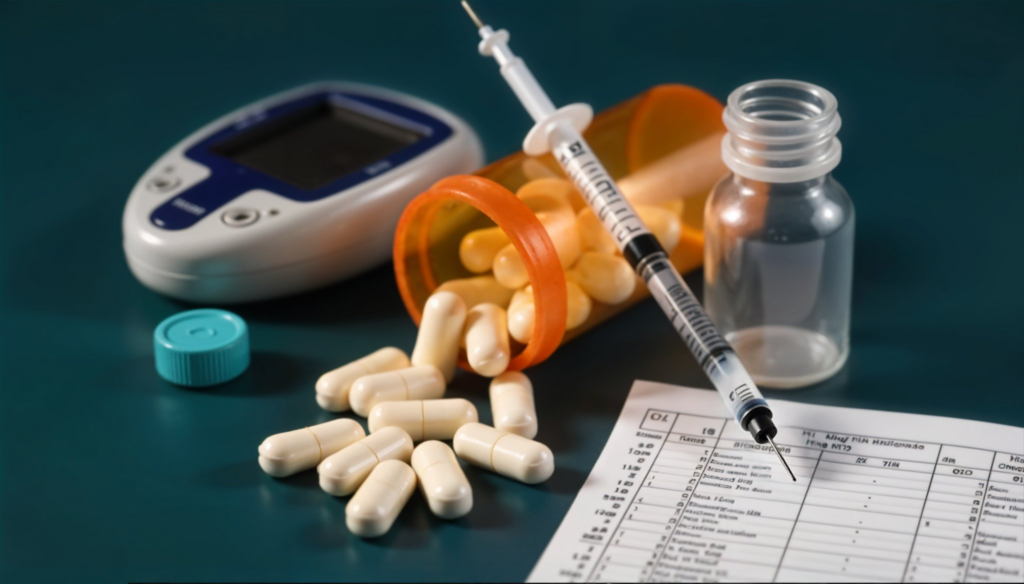
Which Diabetes Medications Promote Weight Loss or Gain? Compounded Semaglutide or Compounded Tirzepatide
Diabetes is a chronic medical condition that affects millions of people worldwide, of whom most have Type 2 diabetes. Good control of blood sugar is essential for physical health, and medications play a crucial role in this regard. Nevertheless, certain diabetes medications influence body weight by losing weight or leading to weight gain. It is imperative to know about such effects in those who want to manage diabetes as well as weight. Of all the medications for weight loss support, compounded semaglutide and compounded tirzepatide have been commended as successful options. Alternatively, others are medication that contributes to gaining weight, therefore choosing the appropriate method based on individual health needs is paramount.
Diabetes Medications That Induce Weight Loss
Several diabetes drugs contribute to weight loss by affecting insulin levels, hunger, or glucose uptake. Here is a look at the key drugs that can lead to weight loss:
1. GLP-1 Agonists: A Game Changer in Weight Loss
Glucagon-like peptide-1 (GLP-1) agonists have revolutionized diabetes treatment by reducing blood glucose and body weight. The drugs work by imitating the effect of the GLP-1 hormone, promoting the release of insulin, slowing down gastric emptying, and suppressing appetite.
Drugs belonging to this category include:
- Ozempic (Semaglutide)
- Rybelsus (Semaglutide)
- Trulicity (dulaglutide)
- Victoza (liraglutide)
Research indicates that users of these drugs lose anywhere from 2 lbs to 14 lbs, depending on dosage and time. Of these, compounded semaglutide has been a widely-cited drug for individuals wanting to manage diabetes alongside weight loss.

2. Mounjaro (Tirzepatide): A Dual-Hormone Approach
Mounjaro (Tirzepatide or Compounded Tirzepatide) is unique in that it mimics both GLP-1 and glucose-dependent insulinotropic polypeptide (GIP). The dual effect constricts blood sugar control and yields greater weight loss than with GLP-1 agonists alone.
Patients in clinical trials who were taking tirzepatide lost 16 lbs to 25 lbs in the long term, so it is an excellent option for diabetic patients who need to lose weight. The active ingredient in the drug, tirzepatide, is also available in the form of compounded tirzepatide, offering similar benefits to those seeking personalized therapy.
3. Metformin: A Long-Standing Solution
Metformin is one of the most commonly used diabetes medications as it is both low-cost and effective. Metformin lowers liver glucose output and increases insulin sensitivity in the body. Although metformin is not to be used as a weight-loss agent, metformin is often associated with minor weight reduction, with patients losing up to 6 pounds within a period of one year.
4. SGLT2 Inhibitors: Pushing Out the Excess Glucose
Sodium-glucose cotransporter 2 (SGLT2) inhibitors work by removing excess glucose from the body through urine, reducing blood glucose and causing weight reduction. Some examples of such drugs are:
- Jardiance (empagliflozin)
- Farxiga (dapagliflozin)
- Invokana (canagliflozin)
Studies find that individuals who take SGLT2 inhibitors lose weight ranging from 4 lbs to 6 lbs.
5. Symlin (Pramlintide): Appetite Control for Weight Loss
Symlin is a synthetic form of the hormone amylin, which slows the emptying of the stomach and suppresses hunger. Not an original diabetes treatment, it has worked in inducing 4 lbs to 7 lbs weight loss in some.

Diabetes Drugs That Can Cause Weight Gain
Even though some of the diabetes drugs cause weight loss, others promote weight gain due to their impact on insulin secretion and glucose storage. The following are the key drugs associated with weight gain:
1. Insulin: A Common Culprit
Insulin therapy is required in the majority of individuals with diabetes, but it does cause weight gain. Patients on insulin for Type 2 diabetes can gain a mean of 4 lbs in the first year, and some can gain up to 11 lbs.
2. Sulfonylureas: Stimulating Insulin Production
Sulfonylureas are a class of medication that stimulate the pancreas to release insulin. The resulting increase in insulin can lead to weight gain, which is usually around 5 lbs. Examples of sulfonylureas include:
- Glimepiride (Amaryl)
- Glipizide (Glucotrol XL)
- Glyburide (Diabeta, Glynase)
3. Thiazolidinediones (TZDs): Affecting Fat Storage
TZDs, or glitazones, work by making the body more sensitive to insulin. They also, though, have an effect on fat storage, resulting in weight gain of between 6 lbs and 11 lbs over time. Examples of some typical TZDs include:
- Pioglitazone (Actos)
- Rosiglitazone
4. Meglitinides: Quick Insulin Release
Meglitinides, or glinides, induce quick insulin release following meals. This injection of insulin has the potential to result in as much as 7 lbs of weight gain in a period of only three months. Some examples include:
- Nateglinide
- Repaglinide
The Impact of Diabetes Medicines on Weight
Diabetes medicines influence body weight by altering the metabolism of glucose in the body. Insulin facilitates the transfer of glucose into cells to be utilized as energy. However, excess glucose is stored as fat, leading to weight gain. Medicines that stimulate insulin secretion, such as sulfonylureas and insulin therapy, are included in this process.
Conversely, medications like GLP-1 agonists and SGLT2 inhibitors induce weight loss by either decreasing hunger or eliminating excess glucose. This is the reason why treatments like compounded semaglutide and compounded tirzepatide are go-to choices for individuals struggling with diabetes and weight.
Weight Change Management from Diabetes Drugs
For anyone concerned about weight gain or loss when managing diabetes, several strategies can be utilized:
- Monitor Your Diet: Choosing nutrient-dense, low-glycemic foods can help prevent excess weight gain.
- Regular Physical Activity: Exercise keeps weight and blood sugar healthy.
- Talk to Your Doctor About Medication Options: If weight gain is an issue, speaking with a healthcare provider about other options like compounded semaglutide or compounded tirzepatide may be beneficial.
- Adjust Treatment Plans: In certain cases, medication adjustments or dose changes may help minimize unwanted weight changes.
Finding the Right Diabetes Medication for You
Selecting the right diabetes medication depends on its effect on body weight as well as on blood glucose. Some drugs cause weight loss, while others lead to weight gain. This information helps patients make informed decisions about their therapy regimen.
For those looking to control diabetes effectively without having to gain unwanted weight, Direct Preventive Care offers compounded semaglutide and compounded tirzepatide. Both have been discovered to control blood sugar levels very well while supporting weight loss. Medical specialists can be consulted to determine if these would be suitable for you.














